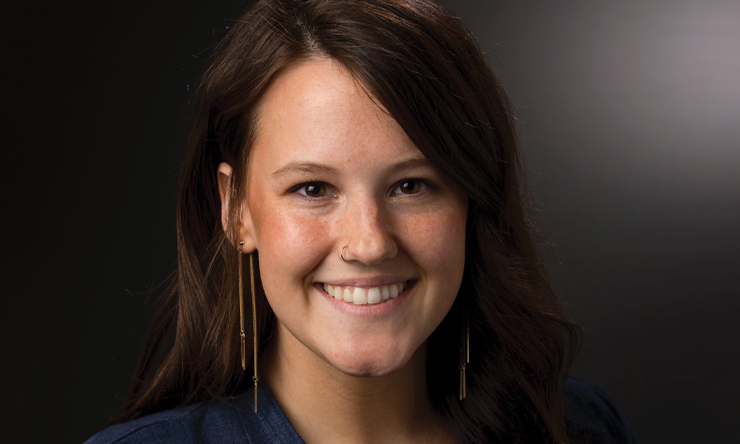"Greetings from Korean farming country, where grapes and pears are eaten after every meal, and people routinely run off the road and into rice paddies," writes Fulbright Scholar Anna Anderson.
How are you managing?
I'm sitting high above the city in a fifteenth floor apartment and I'm managing quite fine. I miss being able to walk out a back door onto real grass, which is in short supply in South Korea. And I miss hearing my siblings playing their various instruments at all hours just as much as I miss the ease with which, at my parents' home, I can find solitude. Because it's just now starting to settle in that this is where I'll be for the next several months, I'm feeling a little bit restless, but I have a routine that keeps me busy and focused. I also have good friends within the school, and fellow Fulbright teachers nearby with whom I can share the joys and frustrations of our new lives.
What is it like to be an American in Korea?
Every American's experience in Korea is different. Although I live in a fairly large-sized city by Iowa-or even U.S. standards-it's still pretty rural for Korea. Because of this, foreigners are a big deal. Children often stop dead and cry, "Miguk!" (an American!) when they see me. I have been mistaken for a Russian, being tall and markedly blond. There are teachers at my school who are so nervous about their English that they won't talk to me until they've had a sufficient amount of alcohol. Fortunately there have been several teachers' parties where the soju (Korea's national, vodka-like alcohol) flows, and by now I've talked to just about everyone and waltzed with the principal to boot.
Tell us something about your host family.
The first night I was with my host family we drank several cups of green tea in the traditional tea ceremony, and they taught me how to play a rhythm on a traditional Korean drum. Then they served me spaghetti for breakfast the next morning because it is American food and they wanted me to feel at home.
My host family is very open and generous. I spend my afternoons chatting in broken English and scattered Korean phrases with my host mom, have unofficial grape-eating contests with my host father, and go to sentimental movies where I cry with my 17-year-old twin host sisters. When the youngest daughter runs screaming to hug me hello when I come home, I feel like I'm home.
What has been the biggest adjustment for you, besides the language?
The change from being a student to a teacher has been huge. When sitting in a classroom as a student I often felt oddly shy, out of place and terrified that at any moment the teacher would call on me. As a teacher, my inherent bossy nature thrives and I get to be the one who makes terrified students come to the front of the room.
Take us through a typical day.
I'm slowly settling into a routine. At 6:30 a.m. I struggle out of bed to eat breakfast of rice, kimchi (a side dish of fermented vegetables), and numerous other steamed or fried vegetables with my host family. Occasionally there is toast and usually there is homemade yogurt-the highlight of breakfast. At 8:20 I leave for school. Sometimes my ride takes us out into the countryside. The landscape is very beautiful-blue skies and green-turning-brown rice paddies. I can see mountains in the not-too-far-away distance, and scattered throughout the countryside are little grape vineyards.
The houses are a mix of traditional and modern. From my point of view, my part of the country looks unfinished. There are oriental-style houses with temple-like roofs below the looming concrete apartment complexes.
Once at school, I teach four to five hours a day, including several teachers' workshops that are discussion-based. I have full control of my classes and am finding it somewhat difficult to get the hang of lesson planning.
Around noon I head to the cafeteria for more rice, kimchi, one or two fried vegetables, fruit, and soup. After lunch I either return to my desk to catch up on email, or join other teachers at the school gym to practice badminton or lose a game of ping-pong.
I finish my work around 4:30 and start for calligraphy class, language class or, on the rare day, home. My language classes are in another city an hour away and I catch a ride with the French teacher who lives there. Her accent is a beautiful combination of French and Korean sounds and we spend a comfortable hour chatting.
Riding the bus home or walking along the street you can see the little shops where grape juice is made and packaged into small juice pouches. The smell is like Welch's grape juice- not so sickly sweet, but instead rich, thick and spicy. When I stop to look at the wide plastic strips threaded through ancient machines and watch them become small pouches filled with juice, the ajumma (literally, "aunt") brings me two pouches to keep.
How are you dealing with the cultural differences?
In my effort to understand and adapt to the culture, I try, as much as possible, to do things the way I see them done by Koreans. However at times, I have to remind myself that this project isn't about becoming Korean, but about being open and aware of the way things are done and learning why. During the first weeks of teaching I noticed myself adopting the overly apologetic posture and attitude of some (but not all) of the other female teachers at my school. While it's important to be sensitive to culture differences and to respect and learn from them, it's also important for me to not lose what I see as the positive aspects of my own culture, of myself as a Western woman. This is in large part for me, but it's also my responsibility as a representative of my country. I'm still trying to figure out where I, as the youngest teacher, but a tall, fair-haired American woman, fit into the system of hierarchy at my school.
Have you participated in any Korean holidays or celebrations yet?
Recently I celebrated Chuseok with my host family. This is one of Korea's biggest national holidays where families gather together, play some traditional games, watch special TV programming, and honor their ancestors by preparing a special meal and offering it to the spirits of their deceased relatives. Then everyone gathers and eats the food after a special ceremony of burning incense and bowing.
My host parents, in the tradition of Chuseok, prepared a traditional dress for me, called a "Hanbok," and we visited a national museum for a tea ceremony. A reporter representing our province took my picture, and his story made national news. There were pictures of me drinking tea the wrong way-the woman explaining the ceremony came and corrected me seconds after the photo was taken.
What are you finding most challenging?
One of the biggest challenges is developing lesson plans that provide useful information and engage my students. At my school the students are broken up into classes who stay together all day, from 7:30 a.m. to 11 p.m., for an entire semester with the exception of Sundays and one Saturday per month. They have their own room, homeroom teacher, and hierarchy of leadership-a captain, vice-captain, etc. Among them there are very high and very low level English speakers. I am supposed to target the mid-level students, but a comfortable, middle ground is often elusive.
What's the funniest thing that has happened to you?
During the first week I was asked a lot of questions about my height. Often these questions would come in the written form of something along the lines of, "How...taller...?" I would write "178cm" (5 ft. 8 in.) on the board and everyone would gasp. It was strange though because people kept asking the same question, and in such a funny way. Then I realized that they weren't asking me how tall I was, they wanted to know how they could grow taller.
I ended up teaching them the English word "genetics" and drew a stick figure of my father next to a stick figure of me.
What has been most rewarding so far?
I think it's a little too early to start reaping rewards, but when my students respond with enthusiasm to a lesson plan I've put a lot of work into, or when I hear them use something they learned from the last class, that's when I feel that my time here is well spent.
Anderson, who has since learned how to drink tea the right way, has been in Korea since early July, teaching conversational English as a teacher's assistant at an all-girls high school.
The Fulbright Program is a highly competitive, national grant program that offers students, scholars and professionals the opportunity to teach and study in over 140 countries. Its purpose is to foster empathy between cultures, and to develop and prepare America's future leaders for a global environment.
News
Share This Story



